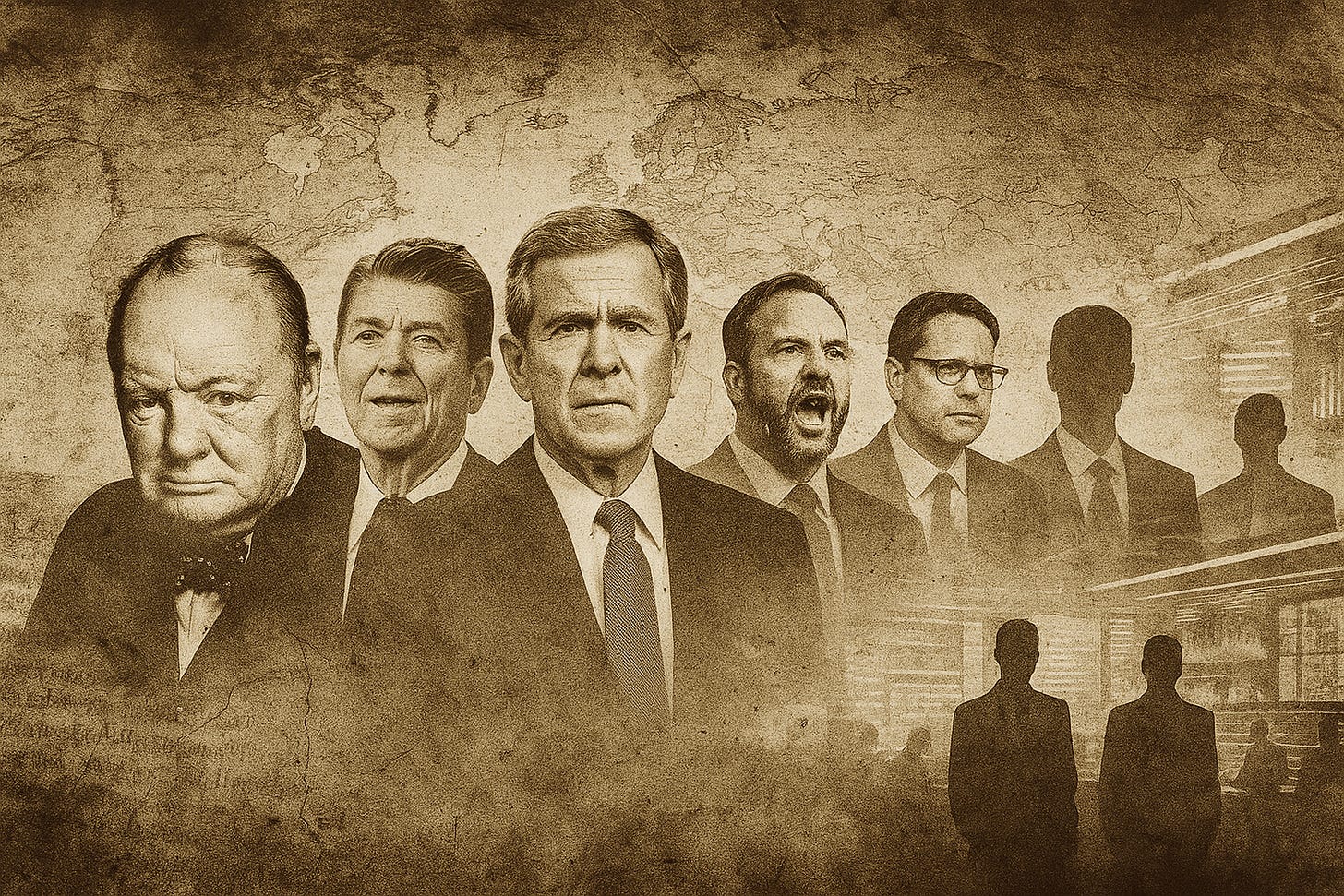A recent tweet from David Petolicchio claimed that James Lindsay is “more conservative” than Joel Webbon.” Despite Lindsay being a pro-porn atheist who was a Democrat only two election cycles ago, he’s now gone through the Gentile humiliation ritual at the Wailing Wall and is super into war, so I guess that counts. The statement was not made to spark a serious debate about theology or policy but to draw a line between the acceptable and the unacceptable Right. Lindsay, who has spent the last few years attacking both the woke Left and the populist Right, has become the preferred kind of conservative in polite company: one who never threatens the structure of the regime. Webbon, by contrast, is the kind of man the regime despises precisely because he does not care to play within its boundaries.
The claim reveals more about the speaker than about either man. Lindsay is a defender of the managerial order that has ruled Western life since the middle of the twentieth century. He wants to conserve the world of 2015, when the parties still pretended to disagree, the global markets ran smoothly, and dissenters were mocked instead of martyred. Webbon’s indifference to being called “conservative” shows how hollow the word has become. The label once meant moral seriousness and the defense of the permanent things. Now it means holding a microphone for the people who ruined them.
THE OLD RIGHT AND THE NEW HERESY
For fifty years conservatives repeated slogans about liberty, small government, and strong families while their leaders built an empire that destroyed all three. They campaigned against cultural decay, yet their donors funded the institutions that produced it. They praised free enterprise, yet they outsourced their own industries. They preached about moral order, yet they governed like secular accountants managing decline. Their victories were symbolic; their defeats were permanent. The base wanted reform. The leadership wanted stability.
The same class that gave us endless wars and open borders now lectures the populists for not being “conservative enough.” Senators like Ted Cruz and Lindsey Graham, commentators like Mark Levin, and figures like James Lindsay define conservatism so narrowly that only their own colleagues qualify. When Thomas Massie or Marjorie Taylor Greene refuse to bow to the consensus, they are scolded for betrayal. The charge is absurd. It is gatekeeping disguised as principle, controlled opposition in a flag pin.
WHAT IS REAL CONSERVATISM?
The word itself deserves an autopsy. To conserve means to preserve what is good and true, but in the mouths of modern Republicans it means to preserve what is already rotting. The moral order that once gave meaning to the term has been replaced by a managerial order that prizes efficiency over virtue. The establishment right has become a coalition of caretakers, tending the institutions that destroyed their own civilization and calling it stewardship. Real conservatism, if it still exists, must begin by rejecting the counterfeit. It must stop conserving the system and start defending the soul.
That is the question this essay will explore. What is real conservatism, and what has replaced it? To answer, we must trace how the old right traded its moral inheritance for institutional comfort, how it learned to love the machine, and why the new right is hated precisely because it remembers what the machine was built to serve.
CONSERVING POWER, NOT PRINCIPLES
Modern conservatism no longer defends principle. It defends possession. The generation that inherited the mantle of the Right after the Second World War learned to prize stability above all things. They were content to inherit a world where liberal democracy had triumphed, global markets were ascendant, and religion was tolerated so long as it stayed out of politics. They promised to defend freedom, but what they actually defended was a structure of management that guaranteed their own relevance. The result was an ideology without conviction. Its adherents learned to speak the language of faith and nation while privately despising both.
The Post-War Consensus produced a kind of political class that mistook survival for virtue. The international order gave them power, so they came to treat that order as sacred. Free markets became holy writ, NATO became an altar, and bureaucratic continuity replaced moral truth as the highest good. This class called itself conservative because it wished to conserve the system that enriched it. That system was never built to preserve truth or virtue; it was built to prevent another world war. Its purpose was management, not meaning. The politicians who came up through it absorbed that ethos. They measured success not by righteousness or renewal but by the absence of disruption.
This is why conservatism lost its soul. It learned to operate as a maintenance department rather than a movement. The men who once thundered about faith, family, and freedom now talk about GDP, supply chains, and international stability. They have substituted moral health with managerial efficiency. They imagine themselves as stewards of civilization when they are only stewards of an inherited machine. When the populist right questions that machine, they react with horror, not because the populists are wrong, but because the revolt threatens their position as custodians. They are no longer guardians of truth but of procedure.
THE SYSTEM AS GOD
Over time, the system they managed became an idol. They came to believe that the global order itself was a moral good. Institutions that once existed to serve people became entities to be served. Government agencies, intelligence networks, and multinational alliances were treated as permanent facts of creation rather than human constructions. Every debate was framed around how to preserve these structures, never whether they were righteous. In this theology, stability replaced sanctity. A peaceful decline was preferable to a righteous upheaval.
This is why the establishment right recoils at populism. The populist spirit judges institutions by their fruit. The establishment spirit worships institutions for their continuity. To the establishment, questioning the system is blasphemy. The populist asks whether the system still serves the people. The establishment replies that the people exist to serve the system. Their faith is procedural.
Real conservatism once understood that order without truth is slavery. The moral law of God is what makes human order worth defending. Without it, institutions become cages. The old right has forgotten that. They kneel before the bureaucratic machine and call it civilization. Their loyalty is to process rather than principle. The greatest heresy in their church is disobedience to the structure. Yet no nation was ever saved by committees or think tanks. A civilization cannot be managed into righteousness. It must be governed by conviction, not compliance. Until conservatives remember that, they will continue to preserve the ruins and call it peace.
WHY THEY FOUGHT THE LEFT (AND NOW FIGHT THE RIGHT)
The same people who claim to be the guardians of civilization once fought the woke Left, not because they disagreed with its moral vision, but because it threatened their institutions. Men like James Lindsay, who once styled themselves as warriors against madness, never aimed at the heart of the problem. They sought to rescue the universities, the corporations, and the bureaucracies that gave them influence. When the radicals began to tear down those structures, the establishment conservatives rushed in to save them, not because they loved truth, but because they loved stability.
Now the populist Right has become the greater threat, and so the guardians have turned their weapons on us. The same voices that warned against the excesses of progressive politics now warn against the “extremism” of anyone who questions the global order. They have become gatekeepers, patrolling the borders of acceptable dissent. Their purpose is not to defeat the Left but to domesticate the Right. Their mission is to keep the boundaries of the conversation safe for the regime. When they attack men like Thomas Massie or Marjorie Taylor Greene as “not conservative enough,” they are really saying that these figures no longer play by the rules of controlled opposition.
This is how the old right survives. It fights both sides of the revolution. It condemns the Left for being reckless and the Right for being radical. It defines itself as the sensible middle that keeps the world from burning. Yet it is that very moderation that has allowed the world to decay. The result is a political culture that never reforms, only delays collapse. The establishment conservative believes that saving civilization means maintaining the system. The populist believes that saving civilization means confronting it. That is why they will always be enemies.
THE LANGUAGE OF LIES
Every ruling class eventually invents its own dialect, a way of speaking that conceals more than it reveals. The modern conservative establishment speaks a language that sounds patriotic and moral but is hollow at its core. Its favorite words are “freedom,” “democracy,” “rule of law,” and “Western values.” These words once meant something. They once carried the moral weight of a civilization shaped by Christianity. In their mouths they now mean nothing.
When they say “freedom,” they mean the liberty of corporations to dissolve nations and outsource virtue. When they say “rule of law,” they mean the slow grind of bureaucratic process that excuses injustice. When they say “democracy,” they mean a permanent oligarchy that lets the people vote but never govern. When they say “Western values,” they mean NATO, the IMF, and every multinational cartel that has replaced the church, the family, and the nation as the custodians of order. Their language is a trick of translation, where every moral term is converted into a technical one.
This is how they keep the illusion alive. They do not need to convince the people that the system is righteous. They only need to convince them that it is inevitable. The slogans of freedom and order serve that purpose. The establishment right uses them to tranquilize dissent. It tells the public that to question these institutions is to betray civilization itself. Yet those institutions are the very ones destroying it. The old words are embalmed inside the system they built, and the men who repeat them are priests of decay.
THE FALSE DICHOTOMY
The greatest success of the post-war order was convincing the public that left and right are opposite poles. In truth they are two wings of the same bird, flapping in circles around the same nest of power. The Left manages decline through social revolution. The Right manages it through markets and manners. Both sustain the global consensus. Both depend on the same bureaucratic core. The difference is only stylistic. One speaks the language of compassion, the other of caution, but neither challenges the machine.
This arrangement requires a permanent drama. The establishment needs the illusion of conflict to keep the public invested. Elections become moral theater, where each side swears to save the nation from the other while both protect the same foundations. The people are allowed to argue about flags, slogans, and holidays, but never about empire, banking, or war. Real populists are exiled from the conversation entirely. When they refuse to play along, they are smeared as dangerous or deranged. The system survives because the actors keep the script.
That is what conservatism has become: a faction inside a controlled political ecosystem designed to contain rebellion. Its leaders are not opponents of the regime but employees of it. Their job is to provide the illusion of moral resistance while ensuring nothing essential changes. They are the gatekeepers of decay, the curators of a dying empire who mistake the hum of the machinery for the heartbeat of a living civilization. Until that illusion breaks, the decline will continue, managed all the way to the grave.
THE GREAT REALIZATION
Every generation reaches a point when its political language collapses. The words lose meaning, the slogans lose power, and the masks come off. That is what is happening to the Right. The supposed divide between Left and Right has been exposed as a managed illusion, a choreographed rivalry staged to protect the same elite consensus. The populist awakening of the past decade was not just about Trump or Brexit. It was about the people realizing that their so-called representatives never represented them.
For years conservatives wondered why they kept losing every cultural battle while winning elections. The answer was simple: the game was rigged to ensure that victory changed nothing. Conservatism was allowed to exist as long as it stayed in its lane. It could oppose socialism, but not corporatism. It could criticize Hollywood, but not the Pentagon. It could scold the universities, but never question the banks. The entire movement was a controlled release valve for frustration, designed to preserve the legitimacy of the system that betrayed its base.
If you appreciate my work, please grab a paid subscription to access exclusive content (like the rest of this article). This is top-tier information and inspiration and you want to be a part of it.
If you don’t do subscriptions, consider a one-time gift of your choosing by clicking the ‘coffee-link’ below.
Listen to this episode with a 7-day free trial
Subscribe to Insight to Incite: Open Source Intelligence Analysis to listen to this post and get 7 days of free access to the full post archives.
















